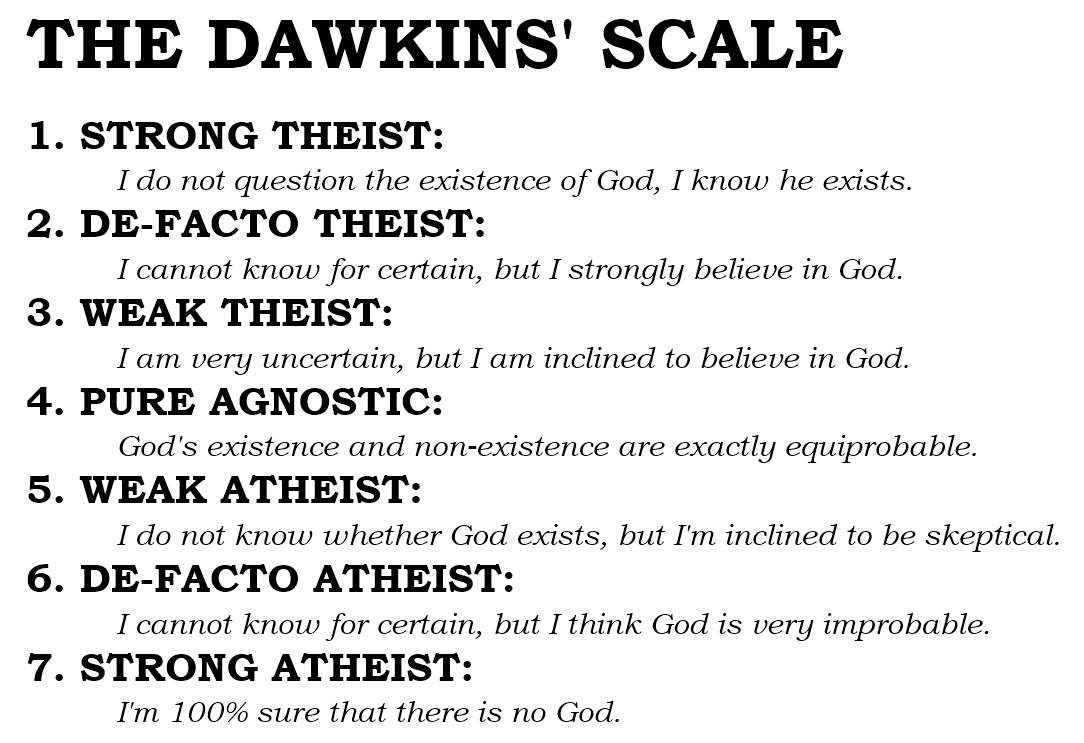The Jason Scale - A Category of Layers of Religious Belief
Apparently there's a Richard Dawkins Religious Belief Scale. I'd never seen this scale before, but to be fair, I've never read Richard Dawkins' books. You see, I don't need someone else to explain to my why I'm an atheist - I already know. It's because I know there are no such things as gods. Per his scale, that would make me a Strong Atheist. Per my scale, that would make me a Gnostic Atheist.
 |
| Stolen from someone on Google+ |
But, being who I am, I found fault with the Dawkins' scale. So, I made my own. I'm going to call it The Jason Scale because, why not. I placed Fundamentalist with "Strong Theist" due to the single fact that anyone who considers themselves a strong believer in their god/s is probably also a strict adherent to the belief system set up by their religion.
I added Gnostic, a word from ancient Greek meaning to know as another position on the scale.
So, a Gnostic Theist, one might assume, is someone who believes in a god or gods, but may not follow the more traditional belief systems. I took this in part due to the Gnostics and the Gnostic Gospels. Gnostics believe in the same god/s as their more fundamental brethren, but not with the blind faith Strong Theists might adhere to their beliefs.
Since an atheist is typically defined (erroneously, I think) as someone who doesn't believe in God/gods, a Gnostic Atheist would be someone who knows there are no gods. Belief is the the word I take issue with, here. To believe or not to believe doesn't answer the question of whether gods exist. I can believe Tarzan of the Apes was a historical figure, but that doesn't make it so; or I can choose to believe George Washington was a fictional character. To know, is a different state of mind altogether. So, I added Gnostic Atheism as a strong atheist with no doubts or room for error.
Like Gnostic, there is another Greek word I borrowed called, Agnostic. It means, not-known. A meaning, not or the opposit and gnostic meaning, well, to know. So, an agnostic is someone who doesn't know, who admits to doubt. An Agnostic, or weak atheist, would then be someone who hasn't seen proof either way and therefore isn't siding with theists or atheists. The benchsitters, if you will.
A True Agnostic will always admit there's no fundamental way to truly know if a god exists or not. If Jesus or Odin or Shiva were to float down on a cloud and speak to a True Agnostic he, or she, would remain skeptical of the deity's godhood.
Atheists, I determined, are those who seek proof and without proof cannot call any creature in this universe a god. Most typical atheists are only atheists because there is no proof of a god's existence. They're the ones who don't take anything on blind faith, but rather rely on scientific method to prove a concept. Imagine someone seeing fire for the first time. How do that person know the fire's hot unless s/he tests it for heat? Should s/he simply take the other's word for it (faith) or should that person test it by getting closer and feeling the heat? If s/he takes that person's word for it, what stops them from believing anything that person claims without proof? Atheists will generally seek proof of concept instead of relying on blind faith.
A Gnostic Atheist is an atheist without doubt. No proof in this universe can make a Gnostic Atheist believe god/s exist. Science and the human mind are generally paramount to a Gnostic Atheist, with the unknown merely being, as yet, unexplained. The answers will come with more time, research and experimentation - no need for gods at all.
The Jason Scale
- Strong Theist/Fundamentalist: My god exists, yours is a myth.
- Gnostic Theist: There is/are god/s, but not how you think of them.
- De-Facto Theist/ Deist: I was taught, and accept a higher power, or god, if you will, but it/he/she does not influence my life.
- Weak Atheist/Agnostic: There is no proof either way, so I'm skeptical.
- True Agnostic: One can never truly know.
- Atheist: There is no verifiable proof in the existence of gods, therefore I must conclude there are no gods until such time as irrefutable proof is provided.
- Gnostic Atheist: There are no such things as gods.
Comments